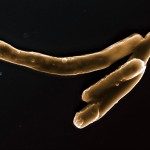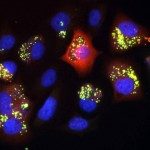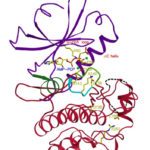Link to Pubmed [PMID] – 16980473
J. Bacteriol. 2006 Nov;188(22):7778-84
The receptor-like protein kinase PknB from Mycobacterium tuberculosis is encoded by the distal gene in a highly conserved operon, present in all actinobacteria, that may control cell shape and cell division. Genes coding for a PknB-like protein kinase are also found in many more distantly related gram-positive bacteria. Here, we report that the pknB gene can be disrupted by allelic replacement in M. tuberculosis and the saprophyte Mycobacterium smegmatis only in the presence of a second functional copy of the gene. We also demonstrate that eukaryotic Ser/Thr protein kinase inhibitors, which inactivate PknB in vitro with a 50% inhibitory concentration in the submicromolar range, are able to kill M. tuberculosis H37Rv, M. smegmatis mc(2)155, and Mycobacterium aurum A+ with MICs in the micromolar range. Furthermore, significantly higher concentrations of these compounds are required to inhibit growth of M. smegmatis strains overexpressing PknB, suggesting that this protein kinase is the molecular target. These findings demonstrate that the Ser/Thr protein kinase PknB is essential for sustaining mycobacterial growth and support the development of protein kinase inhibitors as new potential antituberculosis drugs.



